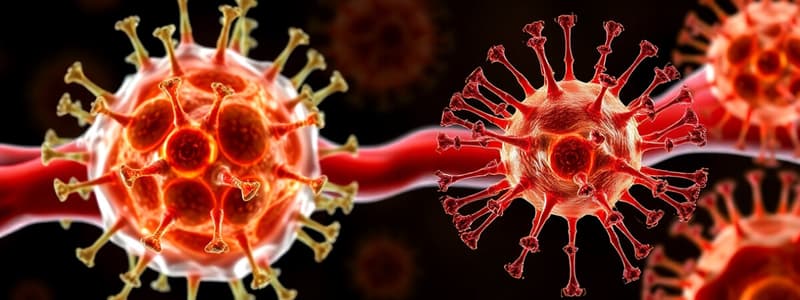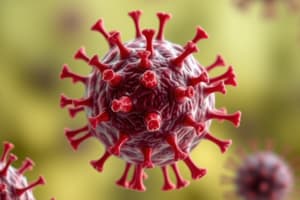Podcast
Questions and Answers
Which of the following is NOT a characteristic of MHC class I molecules?
Which of the following is NOT a characteristic of MHC class I molecules?
- Present endogenous antigens
- Present exogenous antigens (correct)
- Present peptides to CD8+ T cells
- Found on all nucleated cells
The process by which memory B cells rapidly differentiate into antibody-secreting plasma cells upon re-exposure to an antigen is called:
The process by which memory B cells rapidly differentiate into antibody-secreting plasma cells upon re-exposure to an antigen is called:
- Secondary response (correct)
- Primary response
- Isotype switching
- Affinity maturation
Which of the following is NOT a function of the acute phase response?
Which of the following is NOT a function of the acute phase response?
- Adaptive immune cell activation (correct)
- Increased vascular permeability
- Production of acute phase proteins
- Fever induction
The primary function of invariant natural killer T (iNKT) cells is:
The primary function of invariant natural killer T (iNKT) cells is:
Which of the following processes do memory B cells NOT undergo upon re-exposure to an antigen?
Which of the following processes do memory B cells NOT undergo upon re-exposure to an antigen?
Which of the following is NOT a component of innate immunity?
Which of the following is NOT a component of innate immunity?
What is the main function of Major Histocompatibility Complex (MHC) II molecules?
What is the main function of Major Histocompatibility Complex (MHC) II molecules?
Which of the following is NOT a characteristic of adaptive immunity?
Which of the following is NOT a characteristic of adaptive immunity?
Which of the following is NOT a type of professional antigen-presenting cell?
Which of the following is NOT a type of professional antigen-presenting cell?
The primary function of helper T cells is to:
The primary function of helper T cells is to:
Interferons are classified as:
Interferons are classified as:
Which of the following cells does NOT perform phagocytosis?
Which of the following cells does NOT perform phagocytosis?
The process by which lymphocytes capable of responding to a specific antigen proliferate is called:
The process by which lymphocytes capable of responding to a specific antigen proliferate is called:
Which type of immunity is primarily obtained over a person's lifetime?
Which type of immunity is primarily obtained over a person's lifetime?
Which of these vaccines is classified as a recombinant vaccine?
Which of these vaccines is classified as a recombinant vaccine?
Which statement about IgM antibodies is correct?
Which statement about IgM antibodies is correct?
Monocytes differentiate into which type of immune cell?
Monocytes differentiate into which type of immune cell?
Which of the following characteristics does NOT apply to IgG antibodies?
Which of the following characteristics does NOT apply to IgG antibodies?
Diapedesis refers to which process in immune function?
Diapedesis refers to which process in immune function?
Which of the following is NOT a function of the complement system?
Which of the following is NOT a function of the complement system?
The theory of clonal selection implies which of the following?
The theory of clonal selection implies which of the following?
Which option is NOT a good characteristic of a vaccine?
Which option is NOT a good characteristic of a vaccine?
The process by which macrophages engulf pathogens is called:
The process by which macrophages engulf pathogens is called:
Which is NOT a function of antibodies?
Which is NOT a function of antibodies?
Which organ is primarily responsible for T cell maturation?
Which organ is primarily responsible for T cell maturation?
Regulatory T cells play a crucial role in:
Regulatory T cells play a crucial role in:
Somatic hypermutation occurs in which type of receptors?
Somatic hypermutation occurs in which type of receptors?
Study Notes
Innate Immunity
- Innate immunity is the body's first line of defense against pathogens, providing a rapid and non-specific response.
- Components of innate immunity include physical barriers (skin, mucous membranes), complement system, phagocytes, and NK cells.
- Memory B cells are part of the adaptive immune system, not innate immunity.
Adaptive Immunity
- Adaptive immunity is a specific and targeted immune response that develops over time after exposure to pathogens.
- Key features of adaptive immunity include specificity, memory, diversity, and the ability to adapt to new pathogens.
- Immediate response is a characteristic of innate immunity, not adaptive immunity.
- Clonal selection is the process by which lymphocytes with receptors specific for an antigen proliferate upon exposure to that antigen.
- Thymic education refers to the process of positive and negative selection in the thymus, where T cells learn to distinguish self from non-self antigens.
Cells of the Immune System
- B lymphocytes (B cells) are responsible for antibody production.
- T helper cells (CD4+ T cells) activate and regulate other immune cells, including B cells and cytotoxic T cells.
- Cytotoxic T cells (CD8+ T cells) are responsible for directly killing infected or abnormal cells.
- Macrophages are phagocytic cells that engulf and destroy pathogens and present antigens to T cells.
- Neutrophils are the most abundant type of white blood cell and are primarily involved in phagocytosis of pathogens.
- Dendritic cells are professional antigen-presenting cells that activate naive T cells.
- Erythrocytes (red blood cells) don't play a direct role in the immune system and are not antigen-presenting cells.
- Monocytes differentiate into macrophages and dendritic cells.
MHC Molecules and Antigen Presentation
- Major Histocompatibility Complex (MHC) molecules play a crucial role in antigen presentation.
- MHC Class I molecules present peptides to CD8+ T cells, primarily displaying endogenous antigens (proteins from within the cell).
- MHC Class II molecules present peptides to CD4+ T cells, primarily displaying exogenous antigens (proteins taken up from outside the cell).
Lymphatic System
- The lymphatic system plays a vital role in the immune system, transporting lymph, filtering pathogens, and maturing lymphocytes.
- Production of red blood cells is a function of the bone marrow, not the lymphatic system.
Cytokines
- Cytokines are small signaling molecules that regulate immune responses, including inflammation, cell growth and differentiation, and activation of other immune cells.
Immunological Memory
- Immunological memory is the ability of the immune system to respond more quickly and effectively to a pathogen it has encountered before, which is due to the presence of memory cells.
Types of Immunity
- Acquired immunity is the immunity obtained during a lifetime, either through natural infection or vaccination.
- Passive immunity is acquired through the transfer of antibodies from another individual, such as from mother to child through breast milk or through antibody injections.
Antibodies and Immunoglobulins
- Antibodies are also known as immunoglobulins (Ig) and are glycoproteins produced by B cells.
- IgM is the first antibody produced in a primary immune response.
- IgG is the most abundant immunoglobulin in serum, can cross the placenta, and has the longest half-life.
- IgA is the most abundant immunoglobulin in secretions like saliva, tears, and breastmilk, providing mucosal immunity.
Functions of Antibodies
- Functions of antibodies include neutralization of toxins, opsonization of pathogens, activation of complement, and antibody-dependent cellular cytotoxicity (ADCC).
- Antibodies do not directly kill bacteria.
Complement System
- The complement system is a complex cascade of proteins that amplifies the immune response.
- Functions of the complement system include opsonization, cell lysis, inflammation, and chemotaxis.
- Antibody production is not a function of the complement system.
Vaccination
- Vaccines are biological preparations that provide immunity to a particular disease.
- Recombinant vaccines are produced using genetic engineering techniques, such as the Hepatitis B vaccine.
- Vaccines must be safe, effective, and able to induce long-lasting immunity.
- The ability to cause disease is not a characteristic of a good vaccine.
Phagocytosis and NETosis
- Phagocytosis is the process by which some immune cells, such as macrophages and neutrophils, engulf and destroy pathogens.
- NETosis is a process by which neutrophils release DNA and proteins to form extracellular traps that capture and kill pathogens.
Hypersensitivity Reactions
- Hypersensitivity reactions are exaggerated immune responses that can cause tissue damage.
- Types include Type I (immediate), Type II (cytotoxic), Type III (immune complex), and Type IV (delayed).
Autoimmune Diseases
- Autoimmune diseases arise when the immune system attacks self-antigens.
- Characteristics of autoimmune diseases include loss of self-tolerance, production of autoantibodies, tissue damage, and chronic inflammation.
Follicular Dendritic Cells
- Follicular dendritic cells are specialized cells in lymph nodes that retain and present antigens to B cells for activation and antibody production.
Invariant Natural Killer T Cells (iNKT Cells)
- Invariant natural killer T cells (iNKT cells) are a subset of T cells that recognize and respond to lipid antigens.
Acute Phase Response
- The acute phase response is a nonspecific response to infection or injury that involves fever, increased vascular permeability, and production of acute phase proteins.
- Adaptive immune cell activation is not a primary function of the acute phase response.
Important Immune Processes
- Somatic hypermutation is a process that increases antibody diversity during B cell development.
- Isotype switching is a process that allows B cells to produce different antibody isotypes.
- V(D)J recombination is a process of DNA rearrangement that generates diverse antibody and T cell receptor repertoires.
Key Sites of Immune Function
- The thymus is the primary site for T cell maturation.
- The bone marrow is the primary site of B cell and neutrophil development.
- The spleen filters blood-borne pathogens, stores platelets, and contributes to immune responses.
- Lymph nodes are the primary sites of B cell and T cell activation and are where immune responses are initiated.
Studying That Suits You
Use AI to generate personalized quizzes and flashcards to suit your learning preferences.
Description
Test your understanding of innate and adaptive immunity with this quiz. Explore the key features, components, and differences between these two essential systems. Perfect for students studying immunology or biology.




